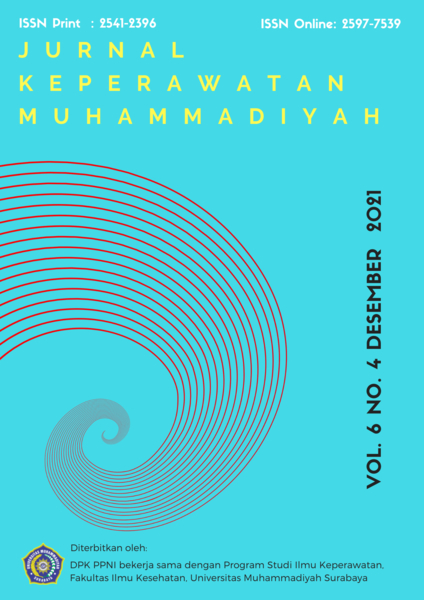Systematic Review Of Physical, Psychosocial And Spiritual Impact Of Post Acute Stroke Patients With Home Dwelling Care Approach
DOI:
https://doi.org/10.30651/jkm.v6i4.10158Keywords:
Keywords, Stroke, Home service, Physical condition, Psichological, Spiritual.Abstract
Objective: Stroke is a severe problem that is physically, psychologically, and spiritually complex. There should be a consideration of increasing self-ability in stroke patients through continued care at home to help patients to improve their quality of life. This study aims to analyze the impact of home-based care on the physical, psychological, and spiritual conditions of post acute stroke patients
Methods: This research is a systematic review. The research source came from two databases, namely ProQuest and EBSCO, with the keywords "Stroke" AND "Home service" AND Physical "OR" Psychological "OR" Spiritual. " From the ProQuest database, there were 66,665 journals found, and from EBSCO, there were 69,501 journals. Out of all the articles, only 8 articles met the inclusion criteria. The article must relate to the types of rehabilitation of stroke patients at home with the outcomes seen in the physical, psychological, and spiritual patients. Articles must use quasi-experimental, pre-experimental, and RCT designs, were published in the last five years, namely from 2014 to 2019, and not in the form of protocols and the English language and full text
Results: Â This research is a systematic review. The research source came from two databases, namely ProQuest and EBSCO, with the keywords "Stroke" AND "Home service" AND Physical "OR" Psychological "OR" Spiritual. " From the ProQuest database, there were 66,665 journals found, and from EBSCO, there were 69,501 journals. Out of all the articles, only 8 articles met the inclusion criteria. The article must relate to the types of rehabilitation of stroke patients at home with the outcomes seen in the physical, psychological, and spiritual patients. Articles must use quasi-experimental, pre-experimental, and RCT designs, were published in the last five years, namely from 2014 to 2019, and not in the form of protocols and the English language and full text.
Conclusion: Home based care could improve the physical and psychological of stroke patient, however it also has spirituality impact with less evidence
Â
Â
References
Anderson, E. Motivasi Pada Rehabilitasi Paska Stroke. Jurnal Skolastik Keperawatan, 2019. 5(1), 21-29.
Apriani, B. N., Hadi, I., Warongan, A. W., & Supriyatna, N. Efektivitas Konseling dengan Pendekatan Motivational Interviewing Terhadap Penurunan Depresi pada Pasien Post Stroke Depression. Holistic Nursing and Health Science, 2018. 1(2), 55-67.
Chumbler, N. R., Li, X., Quigley, P., Morey, M. C., Rose, D., Griffiths, P., Sanford, J., & Hoenig, H. A randomized controlled trial on Stroke telerehabilitation: The effects on falls self-efficacy and satisfaction with care. Journal of Telemedicine and Telecare., 2015. 21(3), 139–143.
Deng, C., Lu, Q., Yang, L., Wu, R., Liu, Y., Li, L.,Yue, Z. Factors associated with stigma in community-dwelling stroke survivors in China: A cross-sectional study. Journal of the Neurological Sciences., 2019. 407, 1164-59.
Hamjah, A., Praptiwi, A., & Sari, E. A. Kecemasan Kematian pada Pasien Stroke. Jurnal Keperawatan ’Aisyiyah., 2019. 6(1), 27–36.
Handoko, K. Perancangan aplikasi mobile panduan rehabilitasi penderita stroke di rumah (Doctoral dissertation, Universitas Multimedia Nusantara). 2017.
Hapsari, W., Risnanto, R., & Supriatun, E. Efektifitas Latihan Activity Daily Living Dalam Meningkatkan Kemandirian Pada Pasien Stroke Non Hemoragic di RSUD Dr Soeselo Slawi. Jurnal Ilmu Kesehatan (JIK) Bhamada, 2018. 9(2), 9-9.
Indonesian Ministry of Health. Info Datin Pusat Data dan Informasi Kementrian Kesehatan RI. Jl HR Rasuna Said Blok X5 Kav 4-9 Lantai Blok C Jakarta Selatan. 2014.
Karunia, E. Hubungan Antara Dukungan Keluarga Dengan Kemandirian Activity Of Daily Living Pasca Stroke. Jurnal Berkala Epidemiologi, 2019. 4(2), 213-224.
Karunia, E. Hubungan Antara Dukungan Keluarga Dengan Kemandirian Activity Of Daily Living Pasca Stroke. Jurnal Berkala Epidemiologi, 2016. 4(2), 213-224.
Loupatty, S. N., Ranimpi, Y. Y., & Rayanti, R. E. Respon Psikososial dan Strategi Koping Pasien Stroke dalam Konteks Budaya Ambon. Jurnal Kesehatan, 2019. 10(3), 480-488.
Rudini, D., & Mulyani, S. Analisis Kebutuhan Perawatan Dirumah Bagi Klien Dengan Stroke di RSUD Raden Mataher Jambi. Jurnal Ilmiah Ilmu Terapan Universitas Jambi. 2019. 3(1), 1-9.
Setyowati, N., & Hasanah, U. Pengaruh Intervensi Kognitif Spiritual Terhadap Penerimaan Diri Pada Klien Stroke Iskemik. Jurnal Ilmu Kesehatan, 2016. 5(1), 19-27.
Sriyanti, N. P., Warjiman, W., & Basit, M. Hubungan Kesejahteraan Spiritual Dengan Kualitas Hidup Pasien Pasca Stroke. Jurnal Keperawatan Suaka Insan (JKSI) 2016. 1(2), 1-8.
Suryawantie, T. Pemenuhan Kebutuhan Dasar Spiritual Pada Pasien Stroke Pasca Akut Di Ruangan Cempaka Rsud Dr. Slamet Garut Tahun 2019. Jurnal Keperawatan Dirgahayu (JKD)., 2019. 1(2), 26-31.
Suzana, M. Hubungan Terapi Rom Aktif Dengan Pemenuhan Activity Of Daily Living (ADL) Pasien Pasca Stroke Di Poli Syaraf Rsu Mayjen Ha Thalib Kerinci Tahun 2018. Menara Ilmu, 2019. 13(5).
Yuanita S, Ratna., Sutriningsih, Ani, Catur A W.R. Mekanisme Koping Keluarga Menurunkan Tingkat Kecemasan Kecemasan Keluarga Pasien Stroke. Jurnal Care, 2015. 3(2), 18–25
Zhu, M., Zhou, H., Zhang, W., Deng, Y., Wang, X., Zhang, X., Lin, Z. Stigma experienced by Chinese patients with stroke during inpatient rehabilitation and its correlated factors: A cross-sectional study. Topics in Stroke Rehabilitation., 2019. 26(5), 342–348
Downloads
Published
Issue
Section
License
- Penulis tetap memegang hak atas karyanya dan memberikan hak publikasi pertama kepada jurnal ini yang secara simultan karya tersebut dilisensikan di bawah:Â Creative Commons Attribution-ShareAlike 4.0 International (CC BY-SA 4.0)













